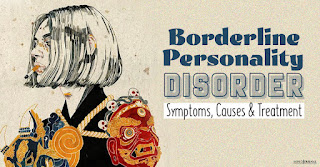Borderline Personality Disorder
A mental health condition called borderline personality disorder affects how you think and feel about yourself and other people.
Making it difficult to function in daily life. Issues with one's self-image, trouble controlling one's emotions and conduct.
When you have a borderline personality disorder, you may find it difficult to tolerate being alone and have a severe fear of abandonment or instability.
Even if you desire to build enduring and meaningful connections. improper anger, impulsivity, and frequent mood swings may drive people away.
Usually, by early adulthood, borderline personality disorder manifests itself. Young adulthood seems to be when the problem is worse. And it may progressively become better as people age.
Don't give up if you have a borderline personality disorder. With treatment, many people with this disease become better over time and can learn to lead fulfilling lives.
What is Borderline Personality Disorder (BPD)
Borderline personality disorder (BPD) is a significant mental illness marked by erratic moods and emotions, as well as relationships and conduct.
The American Psychiatric Association recognizes it as one of the various personality disorders.
Personality disorders are psychiatric problems that begin in youth or early adulthood. Which can last for years and can be quite distressing if left untreated.
However, the correct BPD therapy can make a big difference.
What are the Symptoms of Borderline Personality Disorder?
Borderline Personality Disorder (BPD) might make it difficult to enjoy life or find contentment in your relationships, employment, or school.
It's linked to a variety of issues in interpersonal relationships, self-image, emotions, actions, and thinking, including:
➡ Impulsive Behavior
Borderline Personality Disorder (BPD) is linked to a proclivity for dangerous and impulsive activities. Such as shopping binges, consuming excessive amounts of alcohol, or misusing drugs.
Taking part in promiscuous or unsafe sex, or binge eating. People with BPD are also more likely to engage in self-harming activities.
like cutting or burning themselves, as well as attempting suicide.
➡ Relationships
Individuals with BPD are more likely to have intense relationships with their loved ones, with frequent disagreements, fights, and break-ups.
Borderline Personality Disorder (BPD) is linked to a deep fear of being abandoned by loved ones, as well as attempts to escape actual or imagined abandonment.
This frequently leads to a lack of trust in others, putting relationships under strain.
➡ Emotional Instability
Emotional instability is a common symptom of BPD. Individuals experience rapid mood swings, making them feel like they're on an emotional roller coaster.
(i.e., going from feeling OK to feeling extremely down or blue within a few minutes).
Mood swings can last anywhere from minutes to days and are frequently severe. Anger, worry, and a sense of emptiness are also frequent.
➡ Changes in Thinking Caused by Stress
People with BPD may have paranoid ideas (for example, thoughts that others are attempting to harm them).
or dissociation (feeling spaced out, numb, or as if they aren't actually in their bodies) when they are stressed
➡ Image of Self
People with BPD have issues with maintaining a stable sense of self. They describe a lot of difficulties in their self-esteem.
They may feel good about them one minute and then feel awful or even wicked the next.
NOTE: However, not everyone with BPD exhibits all of the symptoms. Some people may only have a handful, while others may have all of them.
What are the Causes of BPD Borderline Personality Disorder (BPD)?
The specific etiology of BPD, like other psychological diseases, is unknown.
There is, however, evidence that a mix of nature (biology or genetics) and nurture (environment) is at work.
The following are some of the things that may enhance your risk:
➡ Brain Structure and Function
There is evidence of variations in brain structure and function in people with BPD. particularly in the areas of the brain that govern impulses and regulate emotions.
It's still unclear if these variances result from having BPD or whether they are a contributing factor.
➡ Hereditary
Having a parent or sibling with BPD may also raise your chances of acquiring the disorder.
➡ Negative Childhood Experiences
Many people with BPD have had negative childhood experiences.
Such as abuse, trauma, neglect, or having been removed from their caregivers at a young age of 5.
However, not everyone who develops BPD has experienced one of these childhood traumas.
And many individuals who have had them do not develop BPD.
Remember that a risk factor is not the same as a cause. Having risk factors does not guarantee that you will get BPD, and those without risk factors can develop it as well.
Treatment of Borderline Personality Disorder (BPD)
Getting support from a mental health professional is crucial. Because, with continuous treatment, you may have a better quality of life with fewer symptoms.
Borderline Personality Disorder (BPD) is linked to hazardous conduct, self-harm, and suicide, hence therapy can help prevent these behaviors.
Look for someone who specializes in Borderline Personality Disorder (BPD). because you'll require therapies that are tailored to your condition.
It's possible that if you're not getting the correct treatment, it won't be as successful.
The following is the typical treatment order for Borderline Personality Disorder (BPD) :
➡ Psychotherapy
Psychotherapy is the most common form of treatment for BPD.
Dialectical behavior therapy (DBT) and metallization-based treatment are two examples of BPD-specific psychotherapy (MBT).
This might include members of your family, close friends, or careers.
➡ Medication
If you have depression or mood swings. Your mental health expert may prescribe medication to help you manage your symptoms.
➡ Other Options Include
In times of crisis, hospitalization or more intense therapy may be required
BPD symptoms can have a wide range of consequences. Including employment, education, relationships, legal status, and physical health.
This is why therapy is so important. Despite the challenges that BPD might provide.
many people with the disorder live normal, meaningful lives when they follow their treatment plan.
Getting Most Out Of the Treatment
- Take part in your treatment plan.
- Have an emergency preparedness plan in place.
- Grounding Exercises are a great way to practice self-care.
- Obtain Assistance
Coping Strategy for Borderline Personality Disorder (BPD)
Are you ready to learn some new, healthier coping mechanisms? Seeking treatment is one way to do this.
Many psychological therapies for BPD include cognitive-behavioral treatments like dialectical behavior therapy (DBT).
Emphasize the development of stronger coping strategies for dealing with powerful emotions.
There are websites that can assist you in locating a cognitive-behavioral therapist or a DBT provider.
There are things you can do to increase your capacity to function and cope if you have BPD.
You may enhance your quality of life by doing the following steps:
- Play Music
- Seek Help
- Be aware of your surroundings
- Breathe Deeply
- Assist Someone Else
- Ground Yourself
- Engage in Activity
- Play Music
- Have time for yourself.
Benefits of Coping Strategy for Borderline Personality Disorder (BPD)
Since emotion deregulation is such an important feature of BPD.
Many treatments for BPD emphasize the importance of building coping skills. To better manage emotions when they arise.
What are Coping Skills, Exactly?
They are more healthy approaches to dealing with situations and the emotions that arise as a result of them.
Learning new coping mechanisms has the potential to be beneficial. These methods could be used to:
- Coping skills develop self-assurance in your ability to deal with adversity.
- Coping skills improve your capacity to continue to operate normally. Even when faced with adversity.
- developing coping skills reduce the severity of your emotional anguish.
- Coping skills reduce the likelihood that you will do something harmful (e.g., engage in self-harming behaviors) in an attempt to escape from emotional distress.
Frequently Asked Questions
1. What is a BPD Person Like?
People who have borderline personality disorder may go through severe mood swings and struggle with their self-image.
Also, they have the ability to abruptly go from intense closeness to intense hatred of others. Unstable relationships and emotional suffering can result from these shifting emotions.
2. How Do You Tell if You Have BPD?
A BPD sufferer may experience mood swings and shaky relationships.
They frequently have extreme viewpoints, such as all good or all terrible.
Their views on other people are subject to rapid change.
They might, for example, view someone as a friend one day and an opponent the next.
3. Are Borderlines Psychopaths?
Both persons with psychopathy and patients with BPD exhibit a high prevalence of both psychopathic and BPD-specific characteristics.
4. Is BPD the Same as Bipolar?
Despite sharing some symptoms of bipolar disorder. BPD is a distinct diagnosis.
Bipolar disorder is a mood disorder, whereas BPD is a personality disorder.
It's difficult to treat BPD. In order to better care for persons with BPD and enhance their quality of life, research is always being conducted.
5. What Does a BPD Episode Look Like?
Borderline personality disorder is characterized by impulsive and frequently risky actions.
Which includes shopping binges, unsafe sex, drug usage, careless driving, and binge eating.
Besides recurring suicidal thoughts, threats, or self-destructive actions like cutting.
Together with intense and easily fluctuating moods that last anywhere from a few hours to a few days, every episode.
We Hope This Has Been Insightful for You.









